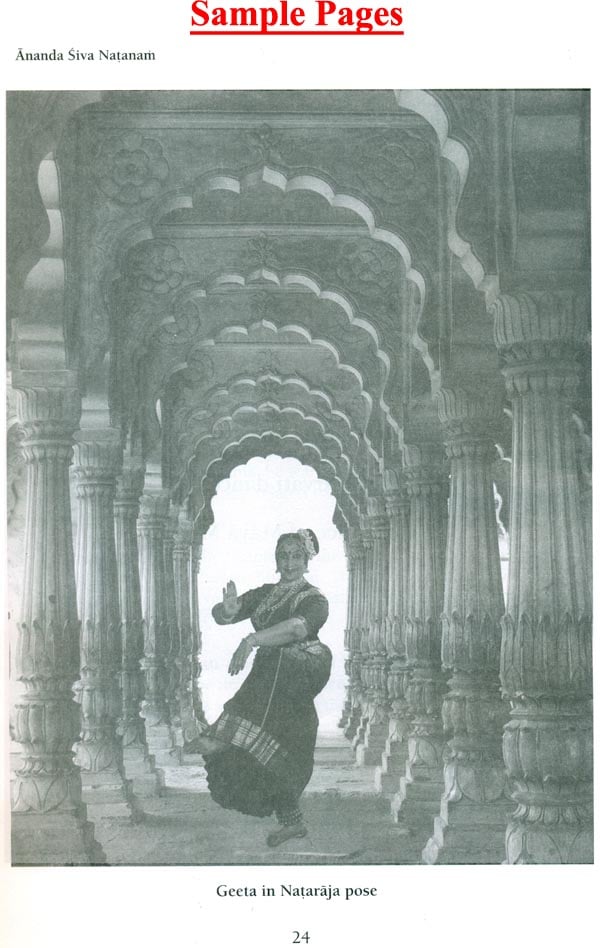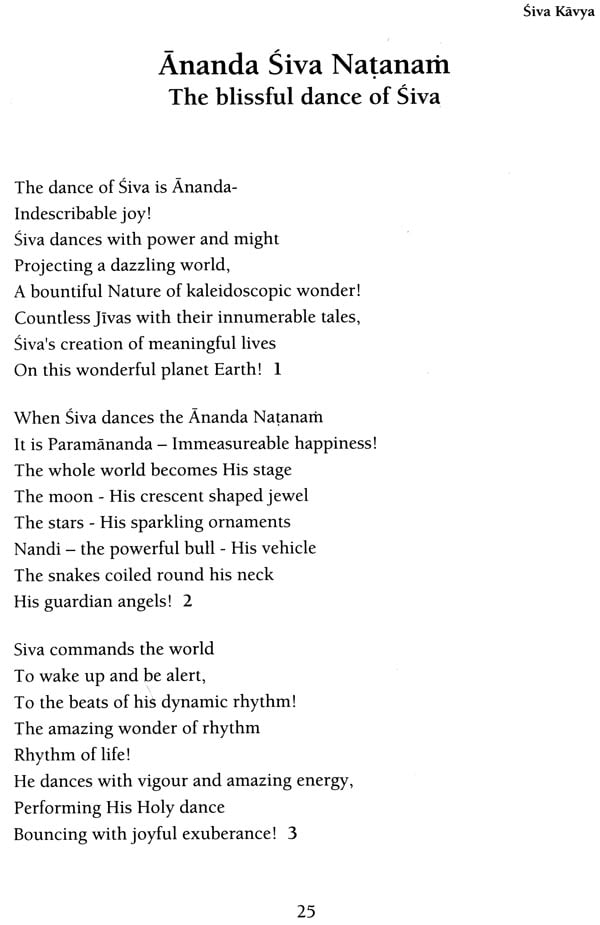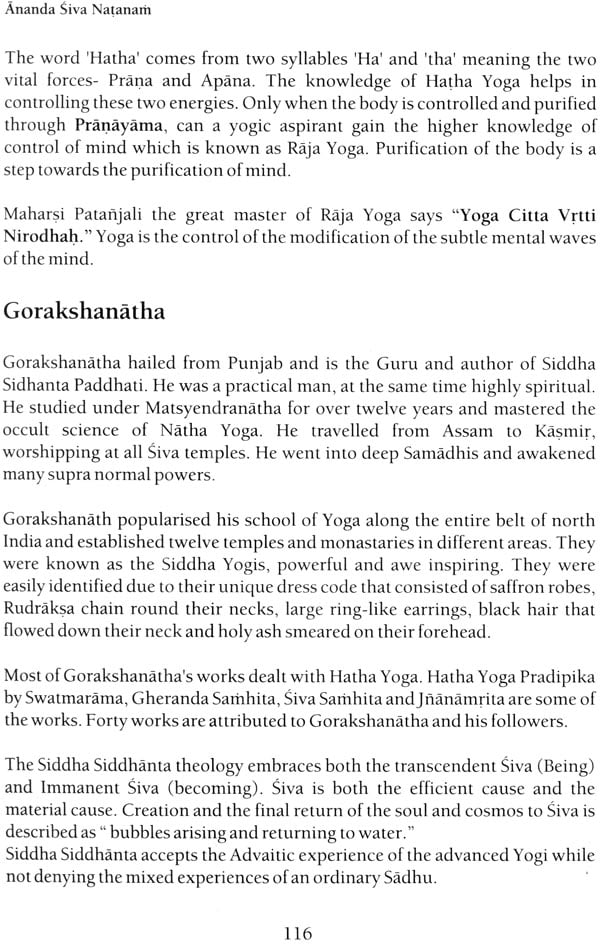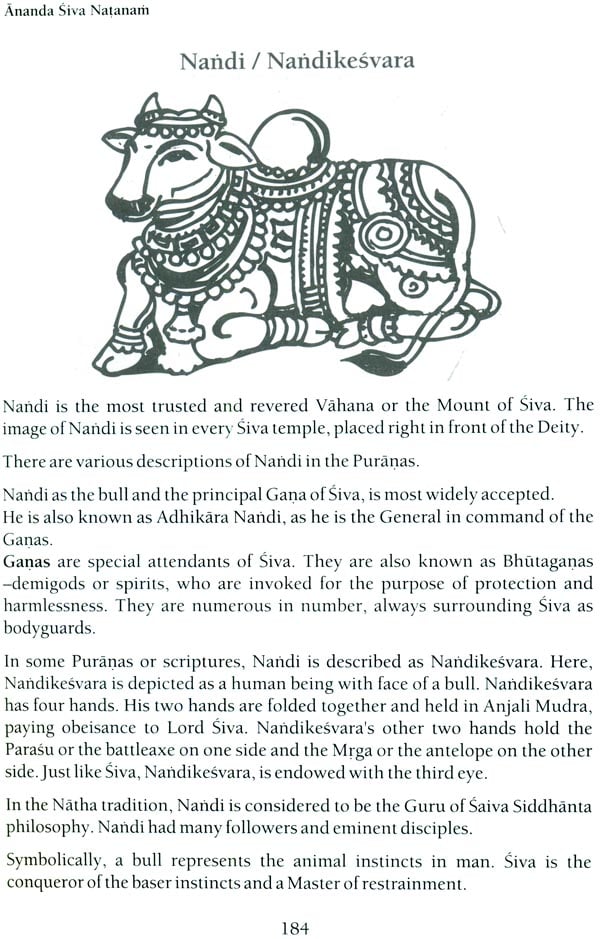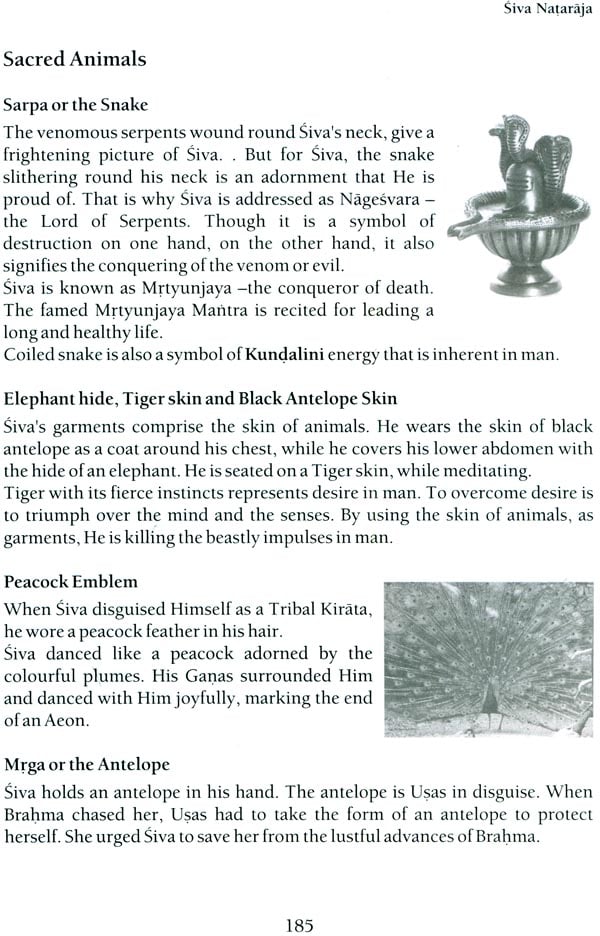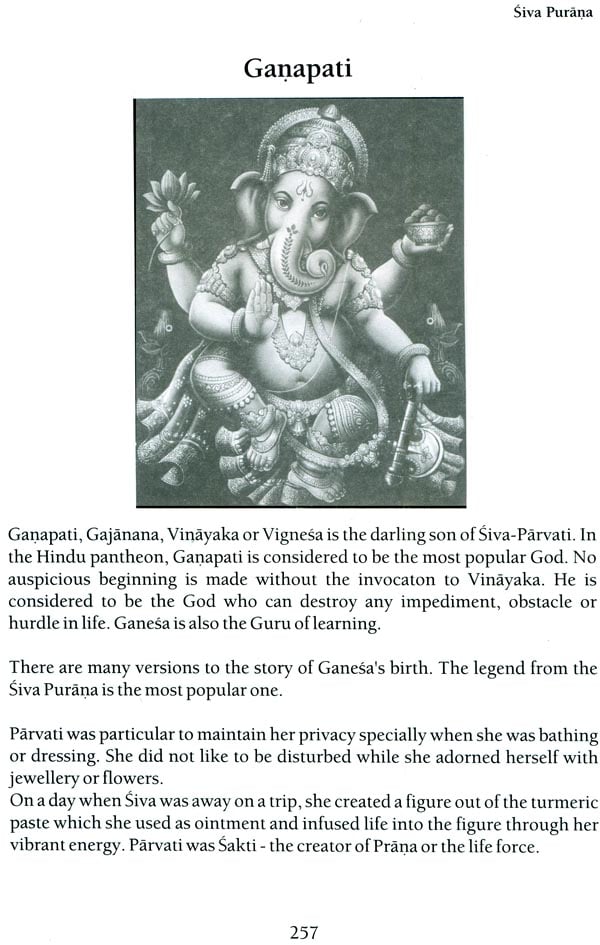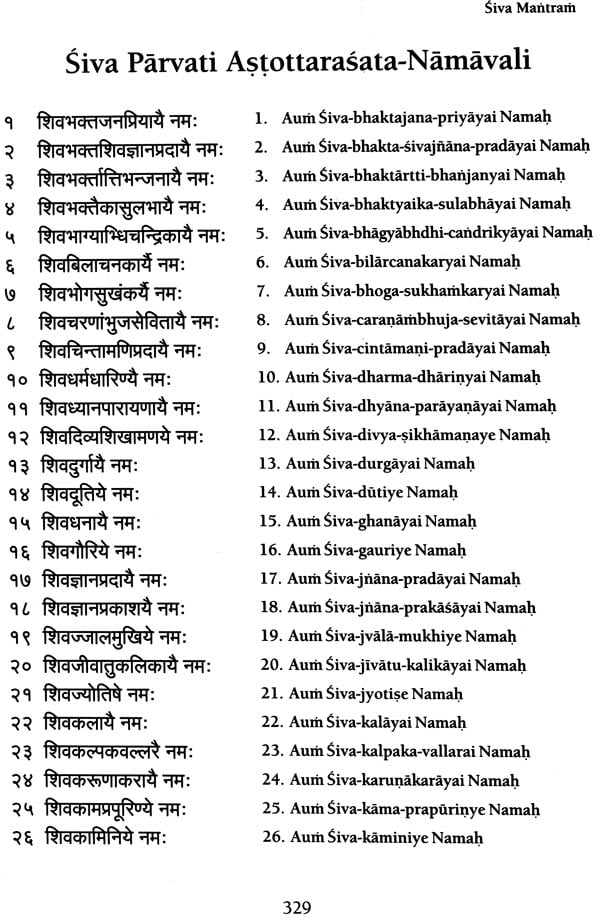
Ananda Siva Natanam - The Blissful Dance of Siva
Book Specification
| Item Code: | NAP922 |
| Author: | Dr. Geeta Radhakrishna |
| Publisher: | MNK Charitable Trust, Mumbai |
| Language: | English |
| Edition: | 2014 |
| ISBN: | 9789352359141 |
| Pages: | 344 (98 B/W Illustrations) |
| Cover: | Hardcover |
| Other Details | 9.5 X 7.0 inch |
| Weight | 700 gm |
Book Description
Dr. Geeta Radhakrishna - A Profile by V. Sivaramakrishnan Art is a form of self-expression. The eternal spirit within, the atman, expresses itself when the artiste's ego is subdued and the senses are disciplined. Transcending the sensual, the spiritual asserts itself when the art-exponent is self- effacing, dedicated and divinely inspired. In Indian culture, beauty which every art-form embodies and proclaims, is not an end in itself. It is considered as a spiritual value associated with sat yam (truth) and sivam (goodness). The end is spiritual perfection variously described as Freedom (moksa) as a state of being or Absolute Bliss (Brahmananda) as an ineffable experience of joy. In other words, Indian art is essentially religious and aims at an experience beyond the physical.
Dr. Geeta Radhakrishna, one of the few brilliant modern exponents of Mohiniattam, subscribes to this exalted form of Indian art. In her career as an artiste during the last four decades, she has harnessed her creative talent as a choreographer to perfection. She has added to her natural gift for the mime, a missionary zeal to popularise Mohiniattam which, during the major part of the nineteenth century, was not ranked as high as Kathakali and other temple arts of Kerala. She has sought to redeem the art almost from obscurity, euphemistically described by the critics and connoisseurs as 'less known' among the dances of Kerala.
Geeta graduated in science from Palakkad; her ancestral house is in the village named Para. She moved to Mumbai in 1973. She studied law in Govt. Law College, Bombay and qualified as an advocate. A chance encounter with the late Shri Soli Batliwala, the Managing Trustee of Bhulabhai Memorial Institute, helped her to make up her mind about her career. Sri Batliwala asked her to stick to Mohiniattam as a performer, teacher and research worker. The die was cast. She chose to dedicate herself to Mohiniattam. In 1978, she met her husband Radha Krishna Menon, who belonged to the same native village, Para-Elapulli, hailing from a reputed tarawad (family) named 'Manavazhi'. They got married in 1979. With his support, she completely devoted herself to Mohiniattam.
Geeta today is one of the foremost performers of Mohiniattam. She has enriched the art by her choreographic masterpieces, the thematic innovations and by her methodology and systematisation of the Mohiniattam 'Adavus' . She has trained over 100 students, Indians drawn from various linguistic groups in Metropolitan Mumbai and foreigners. She has re- vitalised the art by her stylised presentations and has popularised it through over 1000 performances in all parts of India and abroad. The countries she has visited included the U.K., the U.S., Russia, France, Holland, Germany, Switzerland, Luxembourg, Belgium, Sri Lanka and China. She has served as an unofficial art ambassador of India.
Geeta's daughter, Radhika, is also an accomplished dancer and the duo have given hundreds of performances.
Geeta's choreographs need special mention. Thematically, they are both religious and humanistic. These include: 'Narayaneeyam', 'Swamiye Saranam Ayyappa', 'Magdalana Mariam', 'Karuna', 'Krishna leela', 'Nritta Swara Manjari', 'Siva Manasa Puja', 'Prakriti Nrityam', 'Sringara Mohini', 'Geeta Govindam', 'Devi Mahatmyam', 'Arupadai Veedu', besides the compositions of Maharaja Swathi Thirunal and lrayimman Thampi. She has built up her repertoire steadily, step by step, drawing encouragement and support from various sources. She has a large fund of anecdotes connected with her programmers in India and abroad.
Side by side with her Mohiniattam performances, Geeta has also let her pen prance. She has more than half a dozen books to her credit.
The books reveal the writer as one with a sensitive mind, imaginative power, and narrative skill, all fused with aesthetic perceptions.
Geeta has studied German and Russian, and taken an Advanced diploma in Yoga. She knows Naturopathy and practices Reiki. She remains an ardent student of philosophy.
Her thesis on "Narayaneeyam- Philosophy, Bhakti and Aesthetics" - a classic devotional hymn composed by Melpattur Narayana Bhattatiripad has earned her a Doctorate in Philosophy (Ph.D) from the University of Mumbai.
Through "Ananda Siva Natanam", her eighth book, Geeta presents the rhythmic, dynamic, joyous, cosmic and creative dance of Siva." By explaining the various aspects of Siva, theological, philosophical and aesthetic, she reinforces our devotion to the ever-benign Lord.
It has been a thrilling experience for me during the last one and a half years- to think and meditate on 'Siva-the dancing wonder'; and to write about His glorious attributes. I have titled the book "Ananda Siva Natanam". The creation of this book was a joyous adventure.
The plan to write and compose poems on Siva was conceived by me years ago. The Puranas are a storehouse of Siva legends. It is not Siva Purana alone that has stories on Siva, but various other Puranas as well. It was not a difficult task to search out the various legends that were associated with Siva. But more than the stories, it was the philosophy of M that attracted me. I was fascinated with its theistic concepts and philosophical doctrines.
I began my research work on the philosophy of M ten years back. I dived into the Sastras and Puranas and the various texts written by experts, and found that there were six different schools of M. This was a revelation to me. After my initial research, I wrote a few pages highlighting these six schools of Saivism.
As I needed further guidance on the subject, I approached a teacher of philosophy and gave her my work for approval, so that I could go ahead and do further research work. After a few days, when I met her to enquire about my mini-thesis, I was shocked to leam that she had lost it somewhere. I was heart-broken.
A few months later, there was another event in my life that shook our whole family. It was the 26th July 2005 - floods in Mumbai. As we were staying in a ground floor flat, almost all of our household materials were washed away. All my research records and, related books were gone. Our computer was broken and everything that was saved in the computer was totally erased. Leave alone the computer, we were able to salvage hardly anything in the house. Except for our lives and the clothes that we were wearing, we were left with nothing. My husband, my daughter and I were devastated.
It struck me that everything was Siva leela. Siva creates the world and dances in joyous splendour, so also He dissolves everything within Him. At will He evolutes, at will he involutes. He is the master-planner and nothing happens without His Grace.
The first thought after the flood was finding a new house. It was a long and difficult search. Every Monday, I recited the Siva Mantras and prayed that some miracle would happen and we would get a new house, with the bright rays of the sun streaming in. At night, I could look at the bright moon in the sky from the windows of my bedroom.
On a fine Monday, while I recited the Siva prayers, there was a knock on the door by a friend, saying that a new building was being constructed in the very next street and whether I would like to have a look. I went to this place and was amazed to see the name 'Shiva Sadan'. I went in and climbed the five floors chanting the 'Siva Pancaksara Stotra' and there I saw my new house with sun flooding into the rooms in abundance, bringing in the light of divine knowledge and a light cool breeze blowing. To my delight, there were two coconut trees facing the windows of both the bedrooms. It was a luxury in Mumbai. My prayers were answered by Siva's Grace and we succeeded in getting this dream flat.
With the entry into the new house on the auspicious 'akshaya tritiya' day in May 2006, wishes and aspirations that remained dormant for long, began to express themselves. The long cherished ambition of my daughter, to leam at a reputed University abroad took shape. Radhika went to England for her higher studies in 2008. Before leaving for England, she performed along with me the 100th recital of 'Narayaneeyam' at Mahalsa Devi temple in Goa. Performing Narayaneeyam on stage a hundred times was another dream come true for me. In 2009, a secret desire to visit China was fulfilled. I was invited by the then Ambassador Smt Nirupama Rao to perform at the 'Incredible India' function. I was also lucky to visit the famed Great Wall of China during this tour.
By 2010, I had printed and published seven books, one by one, some new, some in their second edition, and 'Geeta Govinda - a love song' in its third edition.
Once again, I got back into the leaming process. In 20lO, I registered myself for Ph.D studies at the University of Mumbai on the subject "Narayaneeyam Philosophy, Bhakti and Aesthetics'. I totally concentrated on this thesis until I submitted my research work to the Mumbai University in December 2012. So, it was after a long break that I returned to my study and research work on Saivism. I re-started my study and writing work on M in 20l3. I feel satisfied and happy that I have now completed the book. Though, it was planned long ago, it happened only now. Man may propose and plan so many things in life, but they happen only if the great Architect of this world decides to let them happen. The Grace of Siva is essential for every endeavour in life. The very first classical dance number that I performed on stage was "Natnam Adinar" in praise of Nataraja in Bharata Natyam style at Tambaram, Chennai; when I was hardly ten years old. My parents' joy knew no bounds when they saw me dance. My Bharata Natyam teacher felt proud that I could quickly grasp the style with its varied Nataraja postures. For the first time, I became aware of the fact that I could dance.
I continued dancing Bharata Natyam, until I went to Cochin where I got trained for Mohiniattam by Kalamandalam Kalyanikutty Amma in Tripunithura. I had my Arangettam in Mohiniattam at Fine Arts Hall in Cochin. On arrival in Mumbai after my graduation in Palakkad, Kerala, I decided to fully concentrate on Mohiniattam and to stick to this style for the rest of my life.
In Mohiniattam style, I presented my choreography "Aum Namah Sivaya" in praise of Siva at Uttara Chidambaram temple in Satara District of Maharashtra, during Sivaratri Mahotsav on 7th March 2003 and later on, at other venues. This year on 27'h June 2014, I performed Siva's Pancaksara Stotra and other dances in praise of Siva and Sakti on the occasion of the installation of Siva as Kirata Murti at Sri Ayyappa temple in Goregoan, Mumbai.
The content of this book focuses on both Saguna Siva and Nirguna Siva. If I had focussed only on Nirguna Siva - the Pure Consciousness alone, I would not have given a true and complete picture of Siva worship in India. To comprehend the philosophy of M, an understanding of the various aspects of Hindu religion is of equal necessary.
| Preface | 8 | ||
| "From Vedic Rudra to Puranic Siva - A study" | 13 | ||
| by V. Sivaramakrishnan | |||
| Chapter I. | Siva Kavya -Verses in Praise of Siva | 23 | |
| I. Ananda Siva Natanarn -The blissful dance of Siva | 25 | ||
| ii. Nataraja- the dancing wonder | 30 | ||
| iii. The dance of Siva-Sakti | 33 | ||
| iv. When Parvati dances | 35 | ||
| v. The dance of Maya Mohini | 37 | ||
| Chapter II. | Siva Darsana - Philosophy of Saivism | 39 | |
| i. Kashmir Saivism | 45 | ||
| ii. Salva Siddhanta | 82 | ||
| iii. Pasupata Saivism | 107 | ||
| iv. Vlra Saivisrn | 110 | ||
| v. Siddha Siddhanta | 115 | ||
| vi. Siva Advaita | 118 | ||
| Chapter III. | Adi Sankara-the Apostle of Advaita Vedanta | 121 | |
| i. Sankara's life | 123 | ||
| ii. Sankara's works | 127 | ||
| iii. Sankara as 'Upadhi Visesa' or the Great Teacher | 131 | ||
| iv. Sivanandalahari | 133 | ||
| v. Soundaryalahan | 138 | ||
| Chapter IV. | Siva Linga | 147 | |
| I. Siva Linga | 149 | ||
| ii. The Twelve jyotirlingas in India | 153 | ||
| iii. Dvadasa jyotirlinga stotra | 171 | ||
| Chapter V. | Siva Nataraja | 173 | |
| i. Nataraja - image and symbol | 175 | ||
| ii. Nataraja's embellishments - Darnaru, weapons, animals etc | 181 | ||
| iii. Siva's Saguna forms or manifestations | 187 | ||
| Chapter VI. | Siva Rasa - Dance & Sentiments | 199 | |
| i. Satvikam Sivam | 201 | ||
| ii. Bharata's Natya Sastra | 203 | ||
| iii. Nandikesvara's Bharatarnava &. Abhinaya Darpana | 206 | ||
| iv. Rasa, Rasanubhava and Astrasas | 211 | ||
| v. The philosophy of Siva Sutras | 218 | ||
| vi. Anandavardhana &. Abhinavagupta | 222 | ||
| Chapter VII. | Siva Purana -Legends on Siva | 227 | |
| i. Puranas | 229 | ||
| ii. Guru Veda Vyasa | 234 | ||
| iii. Naimisaranyam | 237 | ||
| iv. Siva Legends - Who is the greatest one? | 240 | ||
| v. Siva &. Sati | 243 | ||
| vi. Siva &. Parvati | 249 | ||
| vii. Ganapati &. Kartikeya | 257 | ||
| viii. Gunanidhi and Kubera | 262 | ||
| Chapter VIII. | Siva Stotra -Hymns in praise of Siva | 265 | |
| Sanskrit with English Transliteration and Translation | |||
| i. Siva pancaksara stotram | 267 | ||
| ii. Siva sadaksara stotram | 269 | ||
| iii. Lingastakam | 271 | ||
| iv. Sivastakam | 276 | ||
| v. Daridra-dukha-dahana Siva stotram | 278 | ||
| vi. Siva manasa puja | 282 | ||
| Chapter IX. | Siva Mantra | 286 | |
| Sanskrit with English Transliteration and Translation | |||
| i. Mrtyunjaya Mantrarn | 287 | ||
| ii. Key to pronunciation of Sanskrit &. Malayalam words | 288 | ||
| iii. Siva Sahasra Namavalih | 289 | ||
| iv. Siva Parvati Astottarasata Namavalih | 329 | ||
| Chapter X. | 'Nartaki' - A Poem | 333 | |
| Bibliography | 337 | ||
| About the author - A Profile by V. Sivaramakrishnan | |||
| List of books authored and published by Dr. Geeta Radhakrishna |
